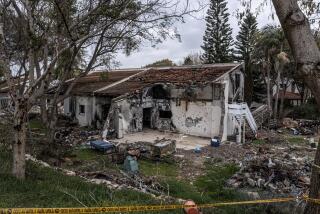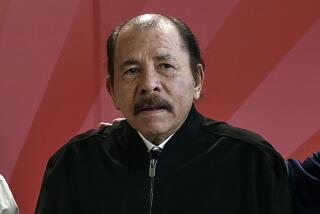Salvadoran Military Assails U.N. Report : Central America: Bitter response to atrocity charges sets off political, diplomatic tremors.
SAN SALVADOR — In a challenge to both President Alfredo Cristiani and the United Nations, El Salvador’s top military commanders angrily denounced an international investigation that blamed them for widespread wartime atrocities, and they suggested that they would fight their ouster.
The bitter military response to the U.N.-appointed Commission on Truth sent tremors through political and diplomatic circles Wednesday and threatened to deepen the hatreds that continue to divide the country after a brutal civil war that claimed 75,000 lives.
Using the most defiant and bellicose language since peace negotiations to end the war began more than two years ago, the army’s high command and more than a dozen other top commanders took the rare step of appearing on national television to attack the U.N. report on human rights abuses.
“We consider the report to be unjust, incomplete, illegal, unethical, partial and insolent,” Defense Minister Gen. Rene Emilio Ponce said in the broadcast, which aired simultaneously on all television stations Tuesday night. “(It) defrauds the hope and faith of all Salvadorans, all of us who were expecting a serious and impartial document that might contribute to healing the wounds generated in 12 years of war.”
Most of the officers, dressed for the broadcast in formal blue uniforms with medals and ribbons displayed, have been named by the Commission on Truth for their roles in committing, ordering or covering up political murders and other abuses.
The commission recommended that about 50 officers be removed from the army and banned for life from any national security position.
Ponce, who read a seven-page statement, was cited in the report for ordering the 1989 murder of six Jesuit priests, their cook and her daughter.
Cristiani has pledged to comply with those commission recommendations within his executive-branch powers. It is within his power to fire military commanders, and he recently promised U.N. Secretary General Boutros Boutros-Ghali that he would complete a purge of 15 top officers, including Ponce and his deputy, Gen. Juan Orlando Zepeda.
The 15 are the last of 102 officers whose removal was ordered late last year by the civilian Ad Hoc Commission, an earlier step in the peace accords. Like the Commission on Truth, the Ad Hoc Commission examined the military’s human rights record as well as corruption and other abuses.
Ponce offered his resignation March 12, three days before the commission report was released, and Zepeda was to have retired this month. But so far, Cristiani has not accepted the resignations of either man, and neither shows signs of leaving office.
In Tuesday night’s broadcast, the military officers made clear that despite Cristiani’s pledge to the United Nations, they would resist the commission’s recommendations, which included steps to reduce the military’s traditional domination of Salvadoran government and society.
While no one is predicting a coup, politicians, former guerrilla leaders and others expressed fears that the military’s resistance would deal a dangerous setback to the peace process--and thus erode the president’s authority.
Cristiani’s political party, the right-wing Nationalist Republican Alliance (Arena), already has attacked the Commission on Truth, and last weekend it pushed through the legislature a blanket amnesty that exonerates military, civilian and rebel figures named in the report.
“It was the last kick of a drowning man,” one Latin American diplomat said of the army’s response. “They are on their way out, and are trying to save face.”
More to Read
Sign up for Essential California
The most important California stories and recommendations in your inbox every morning.
You may occasionally receive promotional content from the Los Angeles Times.











